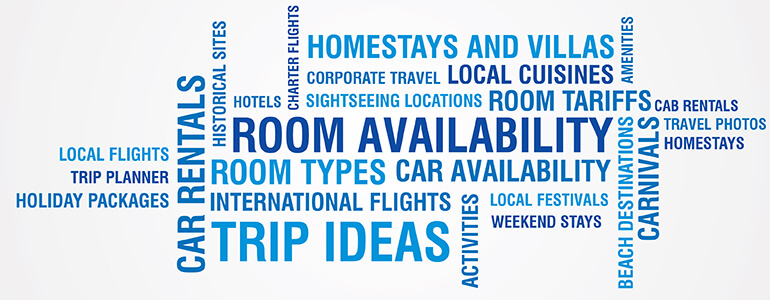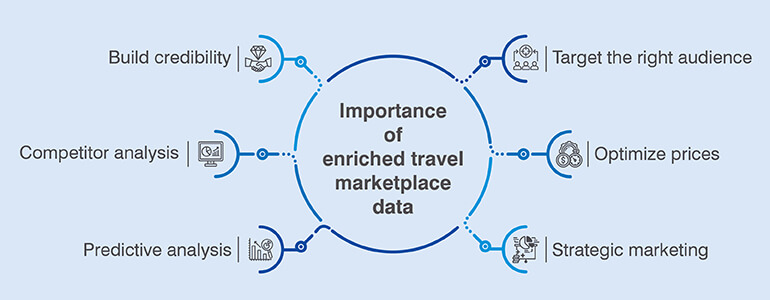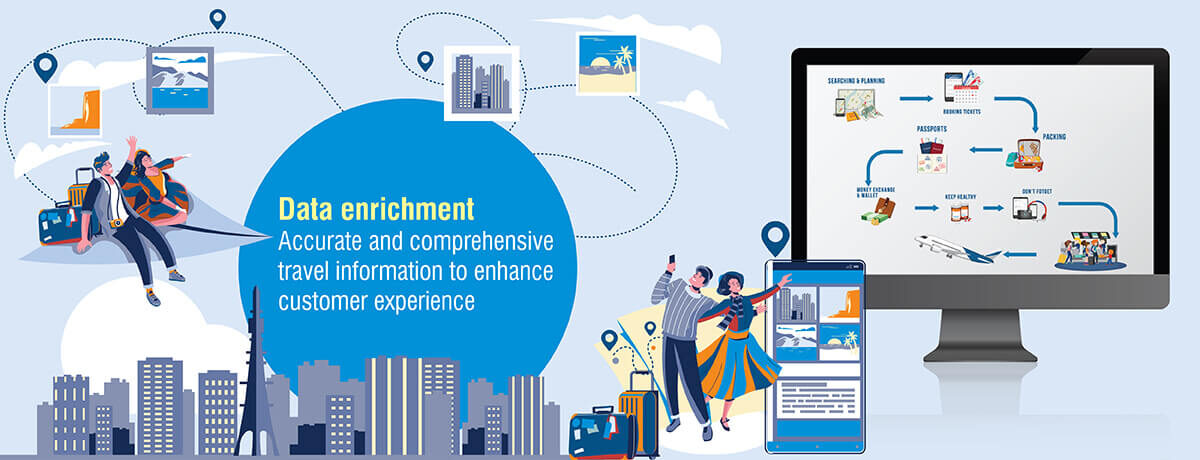Today’s travelers seek comparative intelligence on a wide range of variables like fare, availability, local trends or weather to make up their minds. And for travel portals, understanding data enrichment techniques provides the key to those functional features that modern tourists can’t do without.
For travel portals, the completeness, accuracy, and breadth of data determines the quality of strategic marketing campaigns and customer conversion. Providing this extensive intelligence without diligent data enrichment is not possible.
The worldwide market for online hotel booking is poised to exceed $174 million. The global online travel sector is expected to reach $691 billion USD by 2026. And in this cutthroat market, getting every new customer, or managing to retain an old one, has huge implications.
Customers on your travel site truly seek the finest deals in price, comfort, and location placed at their fingertips. They demand attractive photos and videos, top guides, prime trends, recommendations, and superb comparisons right from the first glance. In short, they want to be sure that they’ve bagged an extraordinary deal.
And travel data enrichment helps travel portals fulfill these exclusive demands and provide magical customer experience.
Essential data points for Online Travel Agencies and other platforms

Hotel details: Near real time information about availability and types of rooms, Tariffs, amenities, packages, check-in, and check-out details, policies etc.
Transport logistics: Details about Cab/car rentals/ types of cars available/tourist coaches for local visits – city routes, timings, charges/ticket fares required to plan the entire trip.
Local events & recreational activities: Information about festivals, carnivals, fairs backed with details of cultural shows, games, yoga, swimming classes, salons arranged by hotels.
Information on tourist spots: Sightseeing locations that attract tourists for its inherent value, historical significance, natural / built beauty offering leisure and amusement.
Local delicacies & cuisines: Information on local food, specialty of the region, must-try cuisines traditionally divided into regions according to the common use of major foodstuffs.
4 challenges that make travel data enrichment important
Customers research and visit up to 38 websites on an average before they click on the BUY button. Detailed and accurate data is crucial for them to make up their minds. Any inaccuracy in the portal search results, indexing, or tagging leads to a loss of credibility and business for OTAs. The main challenges of travel data enrichment include:
Travel data from customer touchpoints: Reaching out to data from travel blogs, social media, websites, and other sources.
Customers’ travel and stay preferences: Including customized deals and offers to help customers self-design their trips.
Extract details from physical documents: Relevant travel inputs from multiple structured and unstructured documents.
Analyzing customers’ online behavior: Generate insights into travel trends, and other factors from multiple data points.
Benefits of enriched travel marketplace data

Target the right customer: Deliver individualized experiences to every customer visiting your travel portal to make them feel special.
Price optimization: Set travel and lodging price bar to enhances sales and profits for effective marketing and customer success management.
Strategic marketing: Get a panoramic view of your customers to have insights about their demands and tailor marketing plans accordingly.
Build credibility: Make your customers feel more connected to your brand so that he or she considers a booking from your travel portal.
Competitor analysis: Know competition’s market share and clientele backed with information on traffic, most frequented destinations etc.
Predictive analysis: Effectively predict, identify, and market new prospects, better understand, retain, and grow existing customer base.
A leading French data aggregation and market intelligence company wanted to overhaul the maintenance of a voluminous hospitality database of over 14.5 million records. With HabileData’s support, the target was reached, and a system was also put in place to authenticate over 2 million additional records annually.
Read the case study5 data enrichment tips to power your travel portal
Enhancing data points with additional information strengthens sales funnels, and marketing campaigns can achieve better personalization. With enriched data, you can dig deep into the psychology of travelers, understand their needs, behaviors, and preferences, and target them accordingly. So, data enrichment for travel marketplaces has become the key to connecting travel service providers with consumers.
Here are some tips to keep your travel portal data enriched for the best results.
1. Details on local events, cuisine, heritage, and culture
Multiple city positioning strategies can attract tourists. The branding of a city, done through advertising local festivals, events, carnivals, and annual fairs, has always been there. Getting all that cultural and cuisine-related data on your database so they show up on searches is the trick.
Carnivals are famous for attracting tourists. For example, the Carnival in Rio de Janeiro, a festival held every year before Lent, attracts millions. Tourism based on local cultural flavors is also catching up.
The UNESCO World Heritage and Sustainable Tourism Program has a new approach where the tourism industry grows and cultural assets are protected. All data that can help visitors attending these special destinations need to be carefully curated, verified, sorted, and packed into travel portal databases. They need to be continuously updated to reflect any changes in event dates or timings.
2. Tag images and videos with captions and information
Sourcing and uploading high-quality images and videos become meaningless if the right information, captions, info-boxes, headings, and other elements do not accompany the visuals. If tagging is not done properly, the visuals and information won’t show up in a relevant context. All of these are part of data enrichment.
A high-quality vibrant image of cultural events or local festivals, or even visuals of local cuisines, attracts tourists. Providing a taste of local events and activities through visuals and videos often drives immediate conversions.
360-degree videos of the location, or spherical videos give a real-time experience to tourists. 62% of leisure travelers and 74% of business travelers want to see a video before making a final travel booking decision. Furthermore, 45% of travelers booked instantly after watching a video of travel activities. However, only diligent data enrichment can ensure those videos show up to relevant visitors.
3. Comparative pricing insights
Competitive pricing intelligence enables customers to make informed decisions. Price is a crucial variable in tourism marketing. Price-sensitive tourists compare rates before zeroing on any property. Therefore, they need to compare package prices of other similar locations and hotels before buying into anything.
Superior comparison engines backed by enriched data provide detailed overviews and comparisons that are sufficient to support purchase decisions.
Keep updating pricing with rack rates, seasonal pricing, last-minute pricing, packages, discounts, off-season rates, and others. Offering a wide selection of pricing strategies will help you get more customers and grow your business.
4. Create value by adding details on trends
Every tourist is different. You may broadly segment them based on multiple variables like age, gender, country of origin, etc. But you need to go deeper into the customer’s online behavior, preferences, search history, and so on to add more value to your campaigns.
Enrich the travel marketplace using social media analytics, where you analyze people and not brands. People share a lot of personal travel memories on social media, and that, if captured and analyzed, helps to decipher trends.
From pricing trends to tourist footfall, information on all trends of tourist destinations, including crime and women’s safety, is essential for modern tourists. Don’t leave out any data your visitors need to buy into a package.
5. Extensive and granular tagging of data
Clustering and segmenting customer data is essential for accurate targeting. Data enrichment helps to provide comprehensive analytical insights into trends and generate segments meaningful to customers.
The travel market is huge; there are budget travelers, people looking for a luxury vacation, business travelers, senior citizens, college groups, young people looking for adventures, and so on. The market thus has varied segments, with different demands and expectations.
Effective targeting, where potential tourists are served information based on their shared characteristics, depends on data enrichment. This can be achieved only by proper tagging of data through enrichment processes and by serving up information based on rules.
Conclusion
A travel marketplace is a platform that connects destination sellers and tourists. Travelers today like to design their trips by themselves, and for that, they look for all-in-one solutions. Tourism companies also keep offering packages and discounts, theme-based tours, and destination event bookings like destination weddings and parties.
However, for any buy-in, today’s customers need detailed information, and the ability to compare all options before spending their money. And that is possible only with meticulous data enrichment, which puts comprehensive information at their fingertips.
Keeping track of data like flight timings, fares, tariffs, room availability, local events, and other information poses a big challenge for the OTA industry. And without continuous data enrichment, data update, cleansing, and making the data consistent for easy integration into target databases, travel portals cannot up their credibility or win customers.
Enrich the data on your travel portal for that competitive advantage.
Contact our experts to provide comprehensive and up to date information on your travel marketplace.
Get started today »




